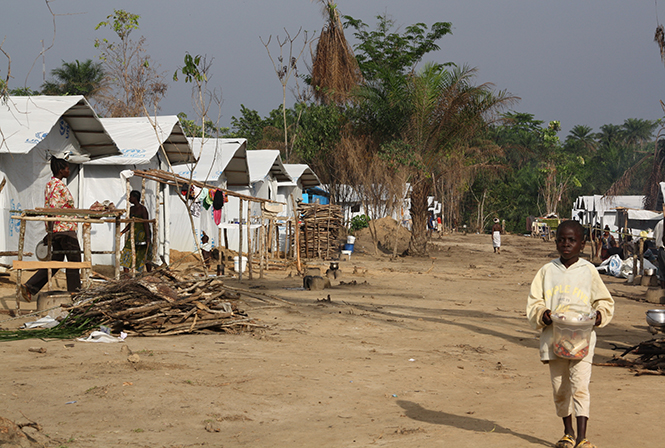WMC Women Under Siege Conflict Report: Liberia (2013)
An estimated 250,000 people died in Liberia’s civil war, which began in 1989 and lasted until 2003—about a century and a half after the country was founded by freed slaves from the United States and the Caribbean. According to the United Nations, some 40,000 women were raped during the conflict.
In 2011, Liberia’s population was estimated at 4.1 million, with indigenous groups making up some 95 percent of the population. Five percent of the population traces their heritage to “freed slaves from the Americas and the Caribbean, free-born African-Americans, and Africans captured from slave ships on the high seas,” according to the Liberian Truth and Reconciliation Commission. Despite being legally free, blacks experienced discrimination and looked to Africa to realize freedom. Enslaved Africans, known as Congo, who the British seized from other countries’ ships as part of the campaign to end the slave trade, joined Americans in founding Liberia. These two groups formed a group called Americo-Liberians, which dominates Liberia to this day.
From the start, indigenous people saw the settlers as colonizers since the settlers took land away from indigenous groups. Throughout much of the 19th century, both groups were at war. The Americo-Liberians ruled the interior in a form of internal colonialism, levying taxes and ruling with military might. As the report of the Truth and Reconciliation of Liberia states, “From its inception, the Liberian state … deliberately and systematically excluded the indigenous population, consigning them to subsistence living whilst exploiting them economically.”
Liberia has operated as a political and social duality almost since its inception. In the rural areas, indigenous people are ruled by local chiefs and attend schools organized by local secret societies. Americo-Liberians have controlled politics and society through the present day. For most of Liberia’s history, men also dominated politics: Women with property were only given the vote in 1947, and indigenous women were only included in the 1950s.
In April 1980, Samuel Doe, of the indigenous Krahn ethnic group, orchestrated a coup against then-President William R. Tolbert. Doe allied with a minority ethnic group called the Mandingos and sought revenge against the Americo-Liberians. He employed Charles Taylor, an Americo-Liberian, as the director of General Services Administration. Taylor diverted money into a Swiss bank account and later fled the country after being accused of embezzlement. He underwent military training in Libya, and returned to Liberia in 1989 to launch an offensive against Doe, who was killed the next year by a fellow militia leader. As head of the National Patriotic Front of Liberia (NPFL), Taylor became a feared warlord in the region.
For more than 14 years, Liberia experienced a violent civil war that killed 250,000 people and displaced more than 1 million across the region, with violence erupting primarily from 1989 through 1996 and from 1999 through 2003. Thousands of Liberians also took refuge in other countries. Sexualized violence was a noted part of the conflict, as was the use of child soldiers. Liberia collapsed into a vicious civil war from 1989 to 1997. After protracted fighting, elections were held in 1997 and Charles Taylor was declared the winner with the blessing of the United States.

As leader of the NPFL, Taylor created a generation of young boys and men who were tied to him through violence. (The unofficial slogan of his election was: “You killed my ma, you killed my pa. I'll vote for you.”) Taylor continued his violence, and the war thus also continued, with new factions involved, until 2003.
With the breakdown of infrastructure and social norms, Liberia experienced a dramatic increase in sexualized violence. Before the war, legal, health, and security services for survivors of sexualized violence were practically nonexistent outside of the capital, Monrovia, and survivors had little redress to the formal system. During the war, women were abducted, gang-raped, forced into “survival sex” (i.e., sex for money or favors, which may be defined as rape by the International Criminal Court), or turned into sex slaves, according to the UN’s IRIN news service.
In 2003, with various armed factions battling for control of Liberia, civilians began to engage in forcing peace. In particular, Women of Liberia Mass Action for Peace organized a peaceful demonstration for months in Monrovia to protest war. They also met with Taylor to ask him to go to peace talks in Ghana.
As depicted in the film Pray the Devil Back to Hell, the Women in Peacebuilding Network (WIPNET) forced warlords and Taylor to make a peace agreement, which brought an end to the war. The August 18, 2003, Comprehensive Peace Agreement was signed in Accra, Ghana. The agreement divided Liberia’s government ministries and commissions between four groups, including Taylor’s government, the rebel groups MODEL and LURD, and the representatives of civil society, who had become influential in securing peace. After an interim government, elections were held in 2005 and Ellen Johnson Sirleaf was elected president, making her the first elected woman president on the continent. In 2011, Johnson Sirleaf won the Nobel Peace Prize, along with fellow Liberian Leymah Gbowee.
Several years into postwar recovery, sexualized violence is still prevalent. The UN Mission in Liberia reports that “rape still remains the number one crime reported to the Liberian National Police, with most of the victims between the ages of 10 and 19.” Evidence suggests that rape continues to be the most frequently reported serious crime in Liberia. According to reports from the World Health Organization, interpersonal violence is also becoming more socially acceptable.
More articles by Category: Gender-based violence, International, Violence against women
More articles by Tag:


























